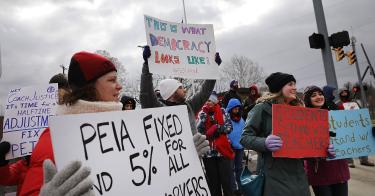For the second year in a row, West Virginia teacher unions have gone on strike, and the Legislature rushed to comply.
While both strikes were illegal, the purpose of this year’s walkout was quite different from last year’s.
The 2018 strike focused on improving teacher pay and benefits, and teachers got exactly what they asked for: raises and a promise that their health insurance wouldn’t go up.
But this year, the unions struck not for better pay or working conditions, but to achieve purely political goals.
Teachers refused to work until legislators gave up a bid to create more learning opportunities for students and provide additional options to students with special needs and those who have been bullied in school. So much for the “they did it for their kids” claim offered by West Virginia teacher union leader Dale Lee.
At issue was a proposal that would have allowed the state to establish seven — count ‘em, seven — charter schools. That’s neither a big nor an unusual “ask.” West Virginia is one of only six states that bar teachers and community leaders from opening these public schools.
Chartering seven new public schools would create employment opportunities for administrators and teachers, but the schools are generally not unionized. Though charters provide new educational opportunities for students, these public schools do not enhance unions’ power — and that’s the real issue here.
What other than political clout would persuade state lawmakers to deny students more education opportunities? Based on achievement measures, seven of the top 10 high schools in the country are charter schools, according to U.S. News & World Report. But surveys show parents care about more than just test scores. Parents and students report that school safety has become a top priority, which gives added importance to research demonstrating that charter schools are safer than district schools. Researchers have also found that boys attending charter schools are less likely to be incarcerated.
The West Virginia proposal also would have allowed parents of special-needs students to access a variety of learning options through education savings accounts. These accounts help parents find personal tutors for their children, make use of special education therapists, and even pay for public school services, sometimes simultaneously.
Six states — Arizona, Florida, Mississippi, Nevada, North Carolina and Tennessee — have education savings account laws similar to what was proposed for West Virginia. With an account, the state deposits a portion of a child’s funds from the education formula into a private account that parents use to buy education products and services. Parents are buying textbooks, paying for online classes and putting money toward college by saving unused account funds from year to year.
In Mississippi and Arizona, surveys have found more than 90 percent of account holders report some level of satisfaction with the system. But individual experiences are even more telling than survey results. Just last week, an Arizona mom and former public school teacher told her state legislators at a hearing, “This incredible program has saved my special needs son and my family.”
Kathy Visser, who has used an account for her son, Jordan, for eight years, added, “I could talk all day about all the amazing ways [education savings accounts] have helped my family and why it is necessary to accommodate the way my children learn, especially my son, who has a host of challenges.”
Make no mistake, West Virginia lawmakers are treating unions like a branch of the state government. Teacher unions have created a blockade against families and students looking for chances to succeed in school and have more opportunities later in life. Taxpayers and parents have another year to ask why and when organized labor was given keys to the state capitol.
This piece originally appeared in Charleston Gazette-Mail




